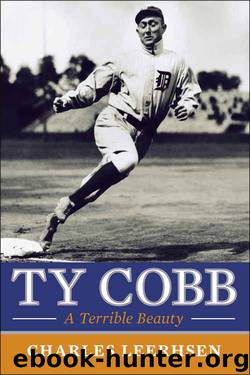Ty Cobb: A Terrible Beauty by Charles Leerhsen

Author:Charles Leerhsen [Leerhsen, Charles]
Language: eng
Format: epub
Publisher: Simon & Schuster
Published: 2015-05-11T21:00:00+00:00
— CHAPTER NINETEEN —
LITTLE DAVID SILVER AND HIS pal little Lester Elliott didn’t think Cobb was so difficult to deal with.
When the Augusta, Georgia, YMCA held a dinner to honor Cobb in January of 1910, those two boys, both age eleven and sons of local merchants, proposed to work for free, as servers, so they could get close to their hometown hero. They got their wish and Cobb wound up shaking their hands, and when he found out how they’d finagled their way in, he insisted that they sit down and eat, and before the evening ended, said the Augusta Chronicle, he came by and “visited” with David and Lester for a while, in the relaxed Southern way, pulling up a chair and chatting with them at their table. Afterward, the boys were said to be “as happy as happy can be.”
Cobb liked children, as most people do. This needs to be said because in his 1994 Cobb, Al Stump portrays his subject as a cackling skinflint who ignored kids’ letters and steamed the one- and two-penny stamps off the self-addressed return envelopes they had enclosed in the vain hope of a reply. Stump was heavy-handed and melodramatic with his imaginary details, but he had an almost unerring sense of what some readers would thrill to—namely, a monster in superstar’s clothing. It is, I must admit, a compelling idea, and a reputation for being a kind of seriously unfunny W. C. Fields has become a part of the Cobb myth ever since. The truth is less fascinating. The real Cobb treated young fans as they should be treated, often talking at length to the ones he met in person, and answering virtually every piece of fan mail, even if it sometimes took him a couple of months to get to a particular question or request. Photographs show him bobbing in a sea of children, pen in hand, smiling—a familiar sports hero pose that has been struck over the years by many. His standard speech to high school students contained these lines: “Whatever you undertake, do with all your might. Work hard, play hard. There is no discredit to being beaten by a stronger opponent, but you should see that there are none stronger than you, if that be possible.” When he was appearing in Atlanta with The College Widow in late 1911, and he heard about a local boy who wanted to see the show but couldn’t because he was seriously ill, Cobb went to the home of nine-year-old George Weyman, sat at his bedside, posed for family photographs and “promised to send him three balls which he has played in the big league games,” said the Chronicle. (Little Georgie bounced back and became a bond trader.)
We know from letters sold at auction that when a child asked for his autograph, he would sometimes provide it (in his trademark green ink) along with a picture or brochure containing hitting tips, and a note of apology for including the unsolicited stuff. He would always say he was honored by the request.
Download
This site does not store any files on its server. We only index and link to content provided by other sites. Please contact the content providers to delete copyright contents if any and email us, we'll remove relevant links or contents immediately.
Machine Learning at Scale with H2O by Gregory Keys | David Whiting(4313)
Never by Ken Follett(3957)
Liar's Poker by Michael Lewis(3450)
The Ultimate Backcountry Survival Manual by Aram Von Benedikt; Editors of Outdoor Life;(3266)
Will by Will Smith(2920)
The Partner by John Grisham(2398)
Can't Hurt Me: Master Your Mind and Defy the Odds - Clean Edition by David Goggins(2342)
Friends, Lovers, and the Big Terrible Thing by Matthew Perry(2230)
Taste by Kris Bryant(1866)
A Short History of War by Jeremy Black(1848)
HBR's 10 Must Reads 2022 by Harvard Business Review(1845)
A Game of Thrones (The Illustrated Edition) by George R. R. Martin(1746)
Never Finished: Unshackle Your Mind and Win the War Within by David Goggins(1714)
515945210 by Unknown(1668)
Why We Love Baseball by Joe Posnanski(1663)
The Arm by Jeff Passan(1614)
443319537 by Unknown(1560)
The Dodgers by Schiavone Michael;(1533)
The Yogi Book by Yogi Berra(1527)
